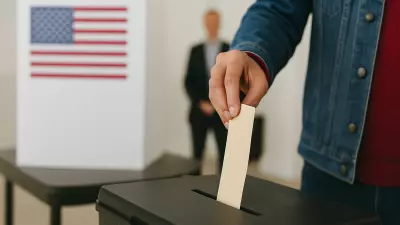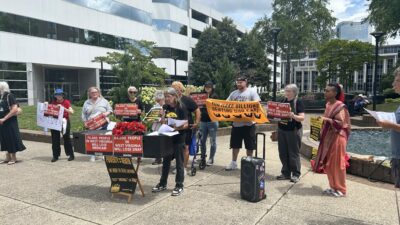Mark Yonkman is the founder of the newly created Super PAC Reclaim the Rural Vote and a rural vote messaging expert. Mark’s background straddles not only the rural and urban worlds but the black/white, gay/straight, and farm/professional worlds as well. Read more of his Rural Whisperer columns here.

Democrats have never really had a plan to address our border crisis other than the laudable goals of being more humane and empathetic with immigrants.
Kamala Harris was tasked with addressing the “root causes” of immigration, but she never really laid out what those root causes are or how she thought we should address them. Her weakness to date on our southern border is real and concerning to rural voters.
Now that she is free to be her own person Harris has an opportunity to shine, to show that she has a handle on national defense issues, and that she has a fix that addresses the “root causes” of our immigration woes.
The key for her is to present this as a national defense issue and not an immigration issue.
Canada, the United States, and Mexico need to act as a unified defense bloc for the next supply chain disruption or other conflict
Rural voters are concerned about the prospect of the next supply chain crisis, terrorist attack, or global war of some kind. And they talk about it. Costco is even selling a prepper’s emergency food kit.
Indeed many believe we are functionally at war on several fronts at the current time. There is also almost daily reporting in the press on both sides that this risk is real. Use it to fix the border.
The Covid pandemic demonstrated how important it is to have control over our supply chain for essential goods. Rural voters I talk to (without prompting) believe that we rely too much on China for essential goods and that we should be manufacturing those goods in the United States. Which of course raises costs, as do all things done in the interests of national defense.
But when I mention Mexico as a part of the solution as a lower cost provider of those same goods, rural voters instantly grasp that this is a viable option to both bring back manufacturing to North America from a defense point of view while at the same time managing expenses. Leverage this.
Our long-term goal should be to end up with a Mexican border that is as easy to police as our Canadian border. When rural voters talk about Mexico being our partner in a North American defense bloc, those voters also wax nostalgic about the wonderful relationship (as perceived by them) the Upper Midwest has always had with Mexican workers.
Mexico has already offered to solve our border crisis for us. Take them up on their offer and engage Canada to task Mexico with securing their Southern border, resolve their gang and cartel issues, and address our sanctions issues.
Reach out to Canada to help with the work necessary to secure Mexico’s Southern Border
For this initiative to work and resonate with voters, Harris must present it as a national defense issue and she must do it with the full support of all three North American economic powers.
The first step must be to engage Canada to join in this initiative. The actual dollar amount they provide is probably irrelevant – optics here are paramount. We are all on Team North America.
It is in Mexico’s interest to secure its borders and eliminate the influence of gangs and cartels – the United States and Canada have the resources to assist with this
Rural voters are aware that the majority of foreigners coming across our southern border during the Biden administration were not, in fact, Mexican.
Rural voters also understand that once a Venezuelan, Guatemalan, or Cuban enters Mexico, Mexico has no interest in stopping that immigrant at its northern border. Letting the immigrant into the United States gets the issue off its plate.
Mexico itself has indicated many times that it is willing to help the United States and Canada with the migrant and narcotic issues plaguing us today. What it wants in return is financial, logistical, and military assistance, as well as the removal of sanctions on both Venezuela and Cuba. Those sanctions are indeed two of the root causes of our immigration woes. Address them.
Is it really our business to be imposing sanctions on Venezuela because one of the candidates is alleging a stolen election (even if we agree)? We need to look in the mirror. Shouldn’t this be a South American issue?
There simply is no reason for a Mexican citizen to cross the border illegally. So long as a Mexican citizen has not been previously deported or has a criminal record, they can obtain a passport to cross the border into the US. Even if they overstay their visa, they have at least been vetted once before entering the country.
The staunchest Trump voter I know said to me that she is comfortable granting an immigrant who has been vetted and obtained a visa a path to citizenship even if they have overstayed their visa. What is important to these voters is that the immigrant has been vetted.
Securing Mexico’s southern border allows us (and Mexico) the breathing room to do this. The problem rural voters have with the recent border legislation is that it essentially would allow up to 4,000 to 8,500 unvetted immigrants to cross the border daily until the President was allowed to shut it down. No one has explained the rationale for this to voters. Securing Mexico’s border would go a long way to eliminating this issue.
Propose a fixed flat employment tax on asylum-seekers
In the meantime, like it or not, current asylum-seekers will be part of the US economy. This is an eager and willing workforce.
To the credit of rural voters, many have expressed the view that if we are going to allow millions of asylum-seekers in our country, we should at least put them to work. That is an inherently farm point of view – there is never a shortage of work on a farm. The family farm, at its core, was an institution that required both full and mandatory employment. There is an intuitive understanding that if you give these immigrants work permits it will benefit the economy. We will simply be producing more.
Harris should propose that those asylum-seekers be given work permits (which could even be limited to certain occupations where we have extreme shortages, like farming) and that they be subject to a minimum flat tax of 15% while they are waiting for resolution of their asylum claims. Any asylum seeker would be happy to pay this tax. This eliminates the counter narrative that these asylum seekers are somehow “costing” us.
And Harris can claim that not only is this fair, but Canada and the immigrants are helping pay the cost of whatever we end up contributing to Mexico to secure their southern border and address their gang and cartel issues.
This is so much more thoughtful than simply arguing that we need to pass the recently proposed border bill. The recent border bill is simply a different way of building a wall.
Conclusion
This proposal addresses every issue the vice president has on the border.
First, it creates military credibility for Harris and shows that she understands national defense and the importance of having a North American defense bloc.
Second, it takes the focus off our border with Mexico.
Third, it addresses the root causes of the immigration problem – those being Mexico’s struggles to protect its southern border and to address its internal gang and cartel problems, as well as the sanctions on Cuba and Venezuela.
Fourth, it shows economic acumen in that she is finding a way to pay for the initiative.
And fifth, it demonstrates international leadership in getting Canada and Mexico to be partners in the border solution and to act as a unified defense bloc.
It is a win for all three countries, immigrants, voters, and Kamala Harris.







